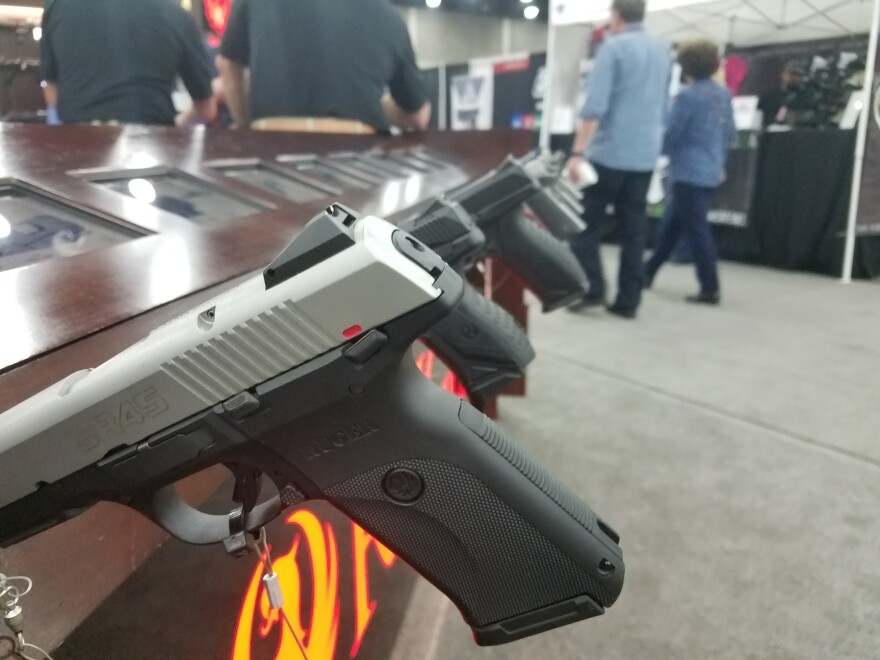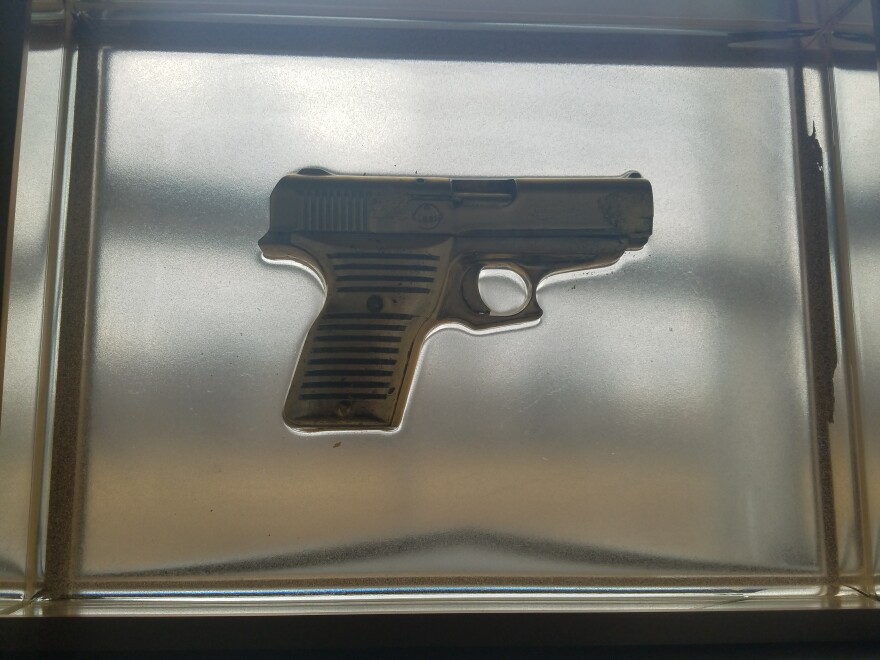Every year, Louisville police officers take hundreds of guns off the streets. Some of them were purchased legally, but were being used illegally. Some were confiscated during arrests or drug searches. Some were owned by felons.
And some were stolen — though only a small percentage of those were likely reported as stolen.
Louisville Metro Police Department Officer Tyler Blissett said it's likely more weapons are stolen than what’s reported.
Blissett has helped LMPD to recover more than 100 firearms so far this year, and said many guns are stolen from people who don’t remember their weapons’ serial numbers.
When gun-owners can’t report those serial numbers, it's nearly impossible to return a stolen gun to its owner.
“There’s a chance that half of these guns that we’ve recovered are potentially stolen, but people just don’t have the serial numbers so we don’t know if they are stolen or not,” Blissett said. “A lot of these reports that have been going for stolen handguns — [gun owners] don’t have serial numbers. So potentially, that gun never gets recovered.”
LMPD data backs Blissett’s claim.
Of 10,715 firearms reported stolen in 2010 through 2017, only 19 percent of them were recovered and connected to a stolen firearm report.
But during that time period, LMPD has steadily increased the percentage of stolen guns officers have recovered. In 2010 they recovered about nine percent of the guns which were reported stolen; in 2017, that number was 32 percent.
Solutions Meet Obstacles
Gun thefts are a frustrating problem for Louisville Metro Police officers, because most thefts are preventable.
Blissett said many weapons are stolen from unlocked cars and homes.
“It’s not a time or the era where you can leave your door open anymore, you have to lock everything up,” Blissett said. “There’s a chance that half of these guns that we’ve recovered are stolen, but people don’t have the serial numbers so we don’t know whether they’re stolen or not.”
Last month, gun owners filled the Kentucky Exposition Center for the Concealed Carry Expo, a three-day event organized by the U.S. Concealed Carry Association. This issue of safe storage, and of using security measures to prevent gun thefts was on a lot of people's minds.
Tim Schmidt, the U.S. Concealed Carry Association’s founder and president, urged people to store weapons in safes when they’re not using them.
For Tony Lambraia, Vice President of Ultimate Training Munitions Worldwide, appropriate weapons storage depends on the situation. Still, Lambraia said gun owners should reconsider leaving firearms in their vehicles.
“You leave two or three guns in your car and then you go into someplace and then somebody kicks in your window, they’ve got your guns. Nobody wants that to happen,” Lambraia said. “You wouldn’t want your laptop stolen so you wouldn’t leave that on the front seat of your car, so why would you leave a firearm that actually could kill somebody?”
Kentucky legislators have tried floating bills to enforce gun storage, but they’ve failed for the past two years.
Suggested laws to prohibit the unsafe storage of weapons failed to pass through the House and Senate committees, and Kentucky law allows legal firearms owners to keep guns in their vehicles without prohibition.
Of 24 gun-related bills and resolutions introduced this legislative session, two passed.
One increased penalties for felons possessing a firearm. The other created rules for flying drones.
The Bigger Picture
According to Kentucky State Police, statewide more than $4.26 million worth of firearms were reported stolen last year. Only about 20 percent of those were recovered — but that's up from the 12-year average of about 13 percent.
| YEAR | STOLEN | RECOVERED | PERCENTAGE |
| 2017 | $4,269,926.00 | $872,283.00 | 20.4 % |
| 2016 | $3,968,275.00 | $627,314.00 | 15.8 % |
| 2015 | $3,446,800.00 | $647,842.00 | 18.8 % |
| 2014 | $2,813,105.99 | $354,778.73 | 12.6 % |
| 2013 | $2,843,739.10 | $394,464.42 | 13.9 % |
| 2012 | $3,124,673.82 | $388,025.12 | 12.4 % |
| 2011 | $2,735,072.00 | $356,180.00 | 13 % |
| 2010 | $3,548,216.44 | $377,805.77 | 10.6 % |
| 2009 | $3,467,240.03 | $360,330.99 | 10.4 % |
| 2008 | $2,911,979.27 | $303,483.78 | 10.4 % |
| 2007 | $2,612,144.20 | $313,995.87 | 12 % |
| 2006 | $2,917,647.55 | $369,639.30 | 12.7 % |
| 2005 | $2,465,154.17 | $362,627.83 | 14.7 % |
| TOTAL | $41,123,973.57 | $5,728,770.81 | 13.9 % |
Source: Kentucky State Police "Crime In Kentucky" Annual Reports (2005-2016). Data From 2017 From KSP Sergeant Joshua Lawson.
But per state law, all of those weapons will end up auctioned off to federally-licensed firearms dealers, even if they've been used for crimes.
In general, guns play a huge role in most of Louisville’s fatal crimes. They accounted for 78 percent of the city’s homicides between 2011 and 2015 according to the city’s Health Equity Report, and were involved in nearly 15,000 LMPD cases between 2010 and 2017.
LMPD Lt. Jason Grissom said it’s frustrating to see weapons they recover end up back on the streets through the Kentucky State Police auctions.
“We do a good job of getting a gun off the street, then there’s the potential that it gets back out on the street and gets used in a crime again. So, that’s frustrating,” Grissom said. “It’s kind of scary to know that there’s that many guns out there."
Correction: This story has been corrected to remove a reference to weapons registered under the National Firearms Act: a law that doesn't provide an accurate picture of gun ownership in Kentucky.









